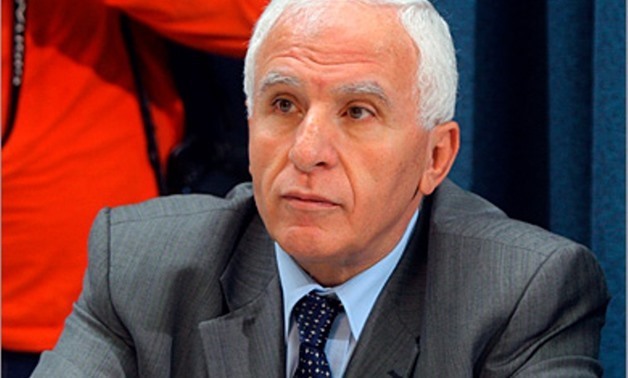
FILE – Azzam al-Ahmad, head of Fatah's Central Committee and delegation
CAIRO - 28 August 2018: Fatah’s reply to the Egyptian paper on Palestinian reconciliation arrived to Cairo on Monday, a movement’s leader announced clarifying that the response relied on the agreements of May 2011 and October 2017.
Azzam al-Ahmad, member of the Central Committee of Fatah Movement and the Executive Committee of the Palestinian Liberation Front, told Voice of Palestine radio on Tuesday that the reply included executive mechanisms to realize reconciliation.
The Palestinian official added that the message stipulated the necessity of implementing all articles agreed upon between Fatah and Hamas since practical steps toward the reconciliation had stopped in Gaza after the bombing that had targeted the convoy of the Palestinian prime minister and the head of the General Intelligence Authority.
Ahmed expressed his hope that Egypt delivers to Hamas the demands, including the return of ministers to Gaza to assume their work normally, ending the work of the committee assigned to study the situation of employees hired by Hamas during the division, and ending the work of committees in charge of reconciliation, public freedoms, and security.
The official referred that any upcoming measures must be within the political framework rejecting the U.S. approach to peace as “it constitutes a conspiracy to end the cause.” He declared openness to discuss any remarks by Hamas.
Ahmad looks forward to the meeting Egypt calls for between Fatah and Hamas to declare their accord on proceeding with the reconciliation and for the other meeting set to take place a week later with all other Palestinian factions that signed the reconciliation agreement last year. Those include the Islamic Jihad Movement in Palestine and the Palestinian Liberation Front.
“We want to end the issue and focus on confronting the malign U.S. strategy biased to Israel,” Ahmad stated, asserting that a ceasefire agreement with Israel should be reached after achieving reconciliation.
“The (Palestinian) president affirmed that our primary issue is (Israeli) colonization. We would not be able to end colonization without accomplishing reconciliation first,” Ahmad concluded.
Reconciliation endeavors and obstacles
A reconciliation agreement was signed in Cairo in October 2017 between Palestinian rival factions Fatah and Hamas in order to achieve more stability within the Palestinian land and authorities.
On September 17, the Hamas movement announced the dissolution of the administrative committee in the Gaza Strip, inviting the Government of National Reconciliation to assume its duties and hold general elections. The movement affirmed it would comply with the Social Reconciliation Accord signed in 2011.
Palestinian Prime Minister Ramy al-Hamdallah and Palestinian Intelligence chief Majid Faraj's convoy was attacked by a roadside bomb in Gaza on March 13. They were uninjured; Hamdallah said he will return to the strip once again to attain inter-Palestinian reconciliation.
During a press conference with his Bulgarian counterpart, President of the Palestinian Authority (PA) Mahmoud Abbas called on Hamas to hand the authority over Gaza to the Palestinian consensus government, especially the security authority, blaming the Islamist group for the repercussions of failing the Egyptian efforts to end the division between Palestinian factions.
Abbas blamed Hamas for the explosion. His remarks threatened the reconciliation efforts to end a decade-old rift between his Fatah faction and the Islamist Hamas group that is dominant in Gaza.
A Fatah delegation will visit Cairo on Saturday to take part in talks with Gaza's factions including Hamas on the truce in Gaza and the Palestinian reconciliation, according to the official Palestinian channel.
The delegation is scheduled to include Ahmad, the Palestinian Authority official in charge of the reconciliation talks, and two senior Palestinian officials considered close to Abbas and Civilian Affairs Minister Hussein al-Sheikh. The Intelligence chief Faraj will not accompany the delegation due to health problems.
Earlier, an Egyptian security delegation headed to Israel in a short visit, to discuss the cease-fire deal between Palestinian factions and Israel.
The visit that lasted for a few hours is a resumption of Egypt’s efforts to deescalate the tension in the Gaza Strip and accomplish reconciliation between the Palestinian factions.
A state of calmness prevailed in the Gaza Strip, after the Egypt-brokered truce was reached between Palestinians and Israelis to put an end to the military escalation in the strip. However, two Palestinians including a medic were killed by Israeli fire on the Gaza border on Aug. 11.
It was the third major escalation since July and came despite attempts by UN officials and Egypt to secure a long-term truce between Israel and Hamas, the Islamist movement that runs the Gaza Strip.
Jerusalem
On December 6, U.S. President Donald Trump announced moving the embassy to Jerusalem and recognizing the city as the Israeli capital. The United States and Israel reject the two-state solution targeted by Palestinians and Egypt.
Consequently, international objection and protests in the Palestinian territories erupted. Clashes between protestors and Israeli security forces resulted in 10 deaths and over 2,000 injuries.
The Emergency Special Session of the General Assembly on the U.S. decision, called for by Turkey and Yemen, took place on December 20, three days after the United States vetoed the Egyptian-drafted resolution at the United Nations Security Council (UNSC) objecting the U.S. recognition of Jerusalem as the Israeli capital.
Palestinian officials vowed to take all possible measures internationally after the veto on December 17 as the decision breaches all former United Nations (UN) resolutions on Israel and Palestinian territories.
The UN draft resolution, approved by the remaining 14 UNSC Member States stated that “ decisions and actions, which purport to alter the character, status or demographic composition of the holy city of Jerusalem, have no legal effect, are null and void and must be rescinded in compliance with relevant resolutions of the Security Council.” The resolution, however, does not mention the U.S.
Additional reporting by Ahmed Gomaa

Comments
Leave a Comment